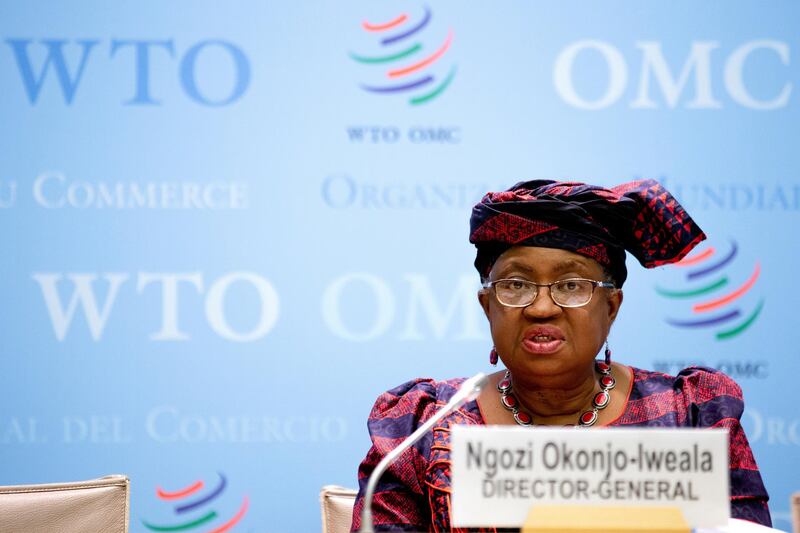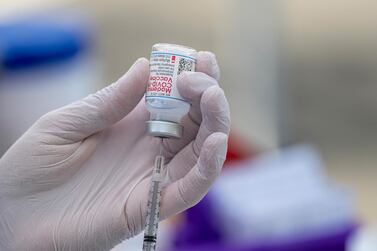The global economy faces a long wait to achieve herd immunity if current inequality in vaccine distribution persists, the new head of the World Trade Organisation said.
Only 0.1 per cent of vaccines that have been administered so far have been in low-income countries, while 86 per cent have been in high and middle-income countries, WTO director general Ngozi Okonjo-Iweala said in an online panel event at the International Monetary Fund's Spring Meeting on Thursday evening.
“If we don’t do something to change the pace at which the poorer countries are getting access to vaccines, it will take a long time to get to herd immunity for the world,” Ms Okonjo-Iweala said.
“This is really in the self-interest of everyone. As we know, mutations and variants are coming out and the rest of the world that has been vaccinated might see the gains they’ve made reversed.”
Earlier this week, the IMF revised its forecast for global economic growth upwards to 6 per cent for this year, higher than its 5.5 per cent forecast in January, citing the rapid vaccine rollout and substantial fiscal and monetary stimulus by governments and central banks.
But the fund also warned of a "divergence" – between countries such as China and the US whose economies are likely to return to pre-pandemic levels this year and low-income countries and smaller, tourism-dependent islands that will still be much poorer.
About 150 countries are unlikely to return to pre-pandemic levels by the end of this year and 110 will still be suffering from the same fate next year.
The fund’s managing director, Kristalina Georgieva, told the panel that governments and central bankers acted “swiftly, decisively and on a large scale” to the economic threat caused by the pandemic, with $16 trillion of fiscal stimulus and the equivalent of $10tn in accommodative monetary policy.
For this year and next, though, “vaccine policy is economic policy”, Ms Georgieva said.
“It is even a higher priority than the traditional tools of fiscal and monetary policy. Without it, we cannot turn the fate of the world economy around.”
The US has had the highest rate of infections of any nation, with more than 31.7m cases declared as of Thursday night. But its rapid distribution of vaccines, with more than 100 million people having had at least one shot and 60 million people now fully immunised, is already providing an economic boost.
More than 916,000 jobs were created in the US in March, a figure which rises to almost one million when revisions for January and February are factored in, Federal Reserve chairman Jerome Powell told the panel.
"We want to see a string of months like that," he said.
Yet even in the the world’s largest economy the recovery remains “uneven and incomplete”, Mr Powell said.
“The burden is still falling on on lower income workers. The unemployment rate in the bottom quartile is still 20 per cent, there’s still 8.5 million people out of work.”
He also said many of the jobs lost during the pandemic may never return if companies invest in technology to replace some roles.
“We need to keep supporting [the unemployed], we need to keep supporting the economy and we will,” he said.
Paschal Donohoe, Ireland's finance minister and president of the Eurogroup, admitted the vaccine programme in Europe had taken time to establish, with 28 million vaccines distributed for the EU's 448 million population in February.
“By the time we get to April, we expect that to be 100m vaccines and the goal that the EU has of vaccinating 70 per cent of our adult population by the summer, we will get there and we will deliver that.”
This will lay the foundation for the EU to be able to supply "billions" of vaccines to the world next year from 50 manufacturing sites throughout the bloc, he said.
Global trade, which contracted 5 per cent last year, will grow 8 per cent this year, Ms Okonjo-Iweala said.
“We see imports and exports in Asia and North America rebounding quite quickly and faster than, say, sub-Saharan Africa and the Middle East. So the divergence we see in recovery is reflected also in divergence in trade,” she said.








